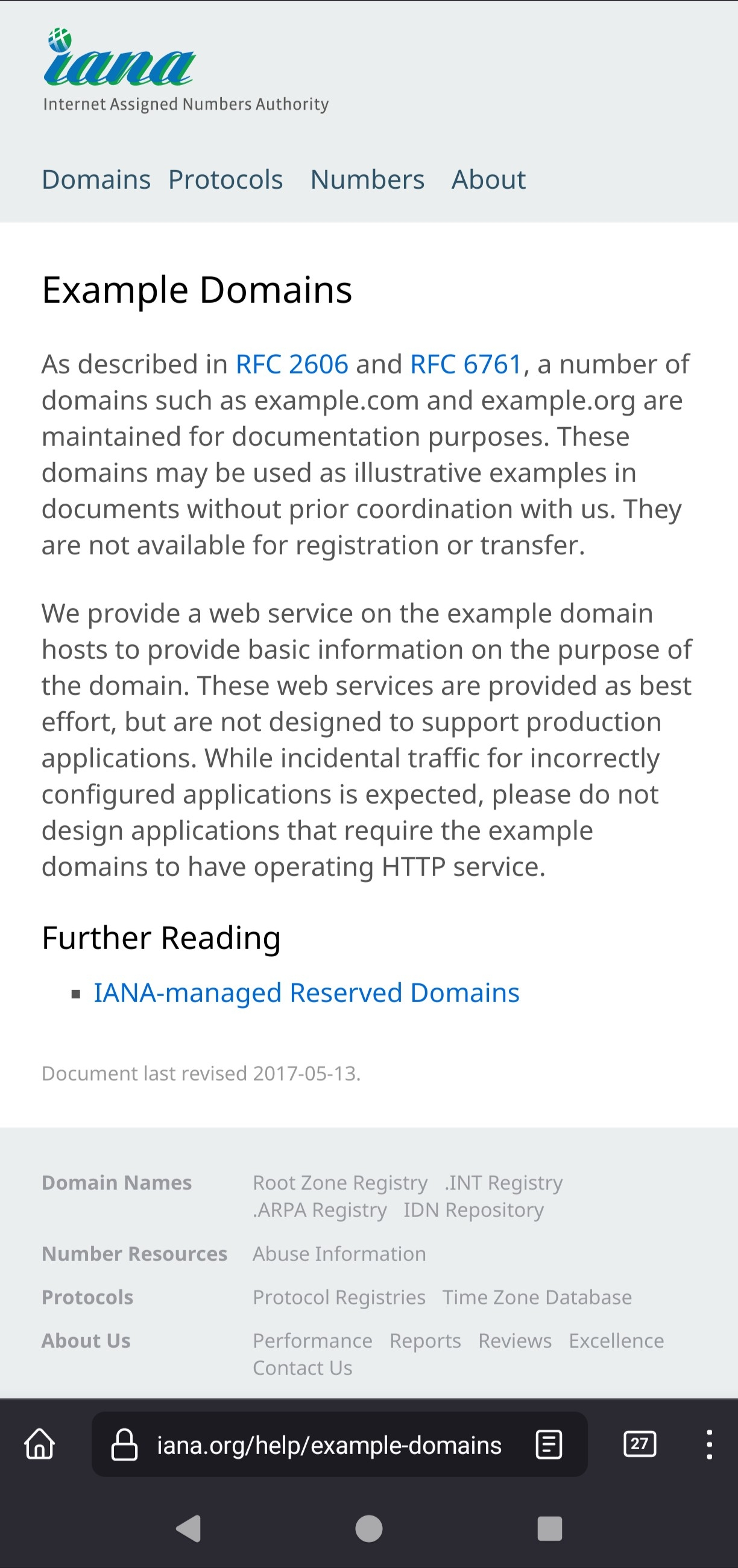- cross-posted to:
- technology@lemmy.world
- cross-posted to:
- technology@lemmy.world
My only question is, why do so few people use Firefox?
Website incompatibility keeps me from using it 100%. Certain websites are simply non-functional except in a Chrome-based browser and I don’t have the shits to give to swap only for those sites. I might start the day with Firefox and by the end I’m using Brave.
Do some websites refuse to function even with useragent spoofing?
I switched back to Firefox about 2 years ago, and I’ve only encountered a few sites that don’t work properly.
With the exception of ONE annoying SaaS site I need at work (which I might use a ton for a week then not again for weeks), I’ve only had to open a site in Chrome/edge maybe once a month. That includes running Firefox on my phone in addition to my work and personal desktop/laptops.
Most internet usage is mobile and people use whatever’s preinstalled on their phone because it just works is my guess.
I see, yeah that makes sense. Especially because mobile firefox really wasn’t that good as a normal browser anyway.
There are features, like swiping the url bar to switch tabs, that are missing on the pre installed Chrome, but the firefox has them. Chrome has nothing to offer over firefox, besides your data collection
I can swipe the URL bar on Chrome to switch tabs, what do you mean?
Ah, seems like it works now, it has been a while since I’ve used it. But it still doesn’t have an option for moving the url bar to the bottom of the screen and blocking trackers.
Any browser without adblock is utter crap. So Firefox with uBlock Origin has been doing great for me. Try the Firefox Beta version, it somehow runs a lot better than stable.
It’s pretty good now and you can install add-ons like uBlock Origin in it.
No idea why I got downvoted but I’ve been using it on my phone since I switched from iOS to android in 2014.
And yes I also very welcome that they finally let you install extensions.
You could install extensions beforehand as well.
And also Firefox on mobile is kind of a hot mess. Videos regularly are unable to play and dark mode is wonky until you restart the app.
Try the Firefox Beta instead of stable, no clue why, but it runs much better. You also get access to “about:config” back (they removed it from the stable version :-/).
Never had any issues. Been using it for years. It was slow in the early days, but now its a better experience then Chrome. Might be different on IOS.
Agree it is kind of buggy on iOS.
Flawless on desktop though.
that’s ironic, because Firefox on iOS is just rebranded Safari, as is every other browser on iOS.
Yeah I know. Sometimes tabs just stop working and I have to kill the app.
Firefox on iOS is just Safari with a skin. You’re likely experiencing quirks with Apple’s WebKit engine.
How do you mean? I’ve been using it for a couple of months now and aside from one website (my bank) everything I’ve tried to do with it has been perfectly fine. It even has adblock and videos play in the background. I’ve also not seen any issues with dark mode; I’m using dark mode right now, actually.
I have auto dark mode during night time. In the morning, my phone will switch to light mode, but parts of the Firefox UI do not. It will be half in and out of dark mode. Bottom toolbar will be dark, but the top bar (notifications, battery, etc.) will be white text against white background. In the mornings, Youtube videos frequently wont play until I restart the app.
deleted by creator
As far as I know, Firefox Mobile doesn’t have a bottom toolbar so I’m not really sure what you are referring to there (at least, there’s no bottom toolbar in Firefox on Android where I’m using it), and the notification/battery area is definitely not part of Firefox. It sounds like your phone’s system UI is providing those elements, and it’s likely not really fair to blame problems with the system UI on Firefox.
Firefox on Android can be configured with the address / tab bar at the bottom - possibly this is what they’re referring to, but that also doesn’t dynamically change per site as far as I’m aware.

I wonder if it’s the diversification within the Chromium user space.
There are a ton of browsers based on Chromium each with their own little gimmick.
On the other side there’s basically just Firefox.
From a casual point of view, I don’t think there’s much reason to go for Firefox. It doesn’t really stand out from that point of view.
Firefox will live on regardless of Mozilla’s support. Since it’s FOSS the community will keep it alive
Will it though? Seems like the kind of task that requires a huge amount of effort, way beyond the kind of capacity you get from casual contributions in peoples’ spare time…might be difficult to maintain feature parity and implement new standards without a full time team on it.
couldnt you say the same about linux?
Linux is cheating by having every major tech company help develop the kernel
firefox doesnt have any corporate friends besides mozilla?
Not many and none that I can think of with deep pockets (besides google). I think the corporate world has almost completely piled on Chrome.
Sounds like we just gotta add Firefox to the kernel while Linus is on vacation.
Linux is currently mostly made by big corpo, but they are held by community and Linus’es checks.
Unfortunetly for browsers most of the giants focused on Chromium, which Google has final say over. Also Linux is OS, where browser should be simple and websites should work even if some one API is not supported. In Chromium’s world web"apps" are won’t be compatible with anything non-Chromium. Any browser would be required to support 99+% of Chromium features or not work.
True, but web designers already treat Firefox and its offshoots as an afterthought. Do you think without Mozilla it would get even worse?
People like this scare me.
I often can’t tell if they are just saying stuff like that to cope or they are really that optimistic/naive. It’s a similar mentality to people constantly giving benefit of the doubt to kickstarter / early access projects that have like a 1% chance of actually living up to the made promises.
the corporate world seems desperate to kill it. its chrome/edge or GTFO
They all want to FULLY control the end user.
- probe and profile the device used
- force unstoppable ads
- require GPS location and maybe 2fa to make sure it’s you that is watching the ads. -web assembly alone will make script blocking impossible and enable scammers to run anything they want.
The end result will be something like the DVD menus from the 90s and 00s. The difference is that it will have full access to all the data on your computer or device.
In swear this mainly has to do with it’s about:config being so much more robust and vast than chromium’s //flags settings. The fact so many privacy related forks (Librewolf, Mullvad, Mull, Tor) are based off of firefox and not chromium (Ungoogled Chromium) should point to why these corporations are seething at it.
Google was/is keeping Firefox afloat via funding as the article points out. This is mainly due to the fact that Google didn’t have a real competitor in the browser space for some time until Microsoft got Edge off the ground and finally killed Internet Explorer.
Personally I see Firefox as being the superior browser for privacy and customization. I also don’t think it’s going anywhere, but it’s funding relying so heavily on one entity is an issue. If Google decides to pull it’s funding of Firefox and no other major corporation steps in to provide the needed cash flow… well who knows, guess it’ll be a chromium world after all.
Good corpos should made suffer ,the more they cope and seethe the better
A huge portion of Firefox code is ancient. Never mind that the codebase is gigantic. Small FOSS projects fail to organize properly, I can’t imagine maintaining Firefox without Mozilla would be a small feat.
Today, only a relative handful of Firefox users are left. According to the US federal government’s Digital Analytics Program (DAP), which gives us the running count of the last 90 days of US government website visits, only 2.2 percent of visitors use Firefox.
Look, I know far fewer people use Firefox than Chrome, but basing it on who uses U.S. government websites in the last 90 days doesn’t even make sense if Firefox users were only in the U.S.
I’m in the U.S. and use Firefox and I haven’t been to a U.S. government website in the last 90 days as far as I know.
And, I don’t know if the author knows this or not, but there’s around 200 other countries out there.
Based off the User Agent varriable?
Some of those government websites only work on chromium too, which is irritating
You guys know of government websites that actually work?
The ones hosted by my government literally shut down outside business hours…
Try to login to view your tax info for example and it’ll tell you to come back 9-5 mon-fri.
For all the flaws of the UK our gov websites show information about gov laws and how to use services, and medical topics.
Back in the day it was the case with IE as well.
The cause?
At least in IE’s case, deliberate siloing of non-standard features needed for table input.
Microsoft didn’t have to write it that way, but they did, knowing it would capture a fucktonne of government and regulatory sites.
I had to support IE all the way to 2018 at one site because the only way they could pull permits was from an ancient government site that only supported IE.
Kinda disappointed in The Register of all things adopting this faux personal life story reporting style on such a matter.
This is the opinion column.
I found the stats re Firefox usage a little surprising/hard to believe so I double-checked them. Indeed, most rankings show Firefox use hovering at around 2.5%. The open web is sort of already dead, I think. It’s honestly not that uncommon now that I come across websites that don’t work in Firefox and there are zero hints or info that you need to use Chrome. It’s like the world has already forgotten that the web isn’t just an app you access through Chrome.
Google’s been working on this more or less since they launched Chrome, so it’s not surprising, but wow, that fucking sucks.
I just like the cute fox picture
Nice try Manifest v3 pushers
Lets just take Firefox and make it the open source standard. If we all get behind it like we did for Blender, we might succeed.
I doubt it tbh.
For blender it’s fine, but for browser engines it’s different because of their sheer size, complexity, need to adhere and collaborate with others to form web standards, need for security experts, day one vulnerability patches, etc.
If Mozilla dies, random volunteers or existing projects like LibreWolf can’t just pick up the slack.
Volunteers can’t run a modern web engine, it takes hundreds of millions per year to upkeep.
There’s a reason why we’re down to just Google, Apple, and Mozilla. Nobody wants to foot the massive bill unless they have a damn good reason for doing so.
It’s probably more expensive to maintain a browser engine than a full operating system at this point. It’s truly insane how large and costly they are.
I’m sure Linus was told the same at some point.
The Linux kernel is actually a perfect example of this.
It’s worked on by hundreds of companies. If it was worked on by a group of volunteers it’d be in a much less useful state right now.
You’re seriously underestimating how large and complex web engines are. There’s a reason we’re down to 3 engines and the community hasn’t been able to create one.
It’s hard to do. It requires hundreds of millions a year to keep going.
I feel like you missed the point.
Webengines are not more complex than a full OS, and yet, Linux works as a community driven project and Chromium does not.
The difference is that Linus is the one with final say in Linux, and he never sold out to a company. Chromium is Google.
It will never be a “community” project, because Google pumps so many resources into it. The goal is obvious: to make sure that it’s always ahead of any competitors, and anyone willing to catch up would have to match Google spending.
The brilliant move here by Google was making it open source. This ensures that no other megacorp needs to fight them, as long as their interests are aligned.
Edge has died already. Safari will follow. The future is grim.
Nah, you’re missing the point.
Again, maintaining a web engine takes hundreds of millions. It’s no small task.
We cannot simply take over from Mozilla if something happens. It needs corporate or governmental backing, a permanent workforce, management at the top who work on setting web standards alongside other companies, etc.
The Linux kernel was brought up against my argument, but it is in fact an argument for it. It is worked on by megacorps, and without that corporate funding would be little more than a tinkerer’s side project.
Linux has the benefit of companies relying on it and therefore wanting to maintain it. Firefox doesn’t. Businesses have chosen Chrome.
KHTML was the basis of WebKit and then Blink/Chromium, so the community did make something. It was just overtaken by the corporate projects, for those same reasons you mention.
those days the web was way simpler than it is now. complexity has doomed every web engine not maintained by a mega corp (and some that were, Microsoft killed their own).
Linux is its own OS, not a Windows clone with the goal of binary compatibility.
With Web browsers the problem is in trying to deceive ourselves that the Web itself is a neutral space. It has long ago become a hostile space, controlled by the enemy. Its standards are intended to prevent pluralism.
Of course they can’t compete on the adversary’s field when that adversary has bigger resources and monopoly in many areas.
What I don’t understand is why nobody has tried to sell the idea of an alternative Web to the wider audience?
Like Gemini, only without the “minimal” and “non-commercial hobbyist” parts.
Without trying to follow Google/MS/etc on the path intentionally chosen to not be passable for others.
That would be excellent, but trying to convince everybody to move to a “new web” would be extremely difficult in itself, even before we start to think about the likes of Google that very much want to maintain the status quo
Arguably since mainly what people actually want from the Web is just a cross-platform document renderer/UI system, if you designed something new from the ground-up with zero legacy nonsense, well, those are both complex problems, but I somewhat suspect we’d end up with something better and easier to develop for than the Byzantine nightmare that is the web.
Network effects would limit growth, but I think as the web gets shittier and shittier there would be growth.
It’s just that when people compare this to Linux vs Windows\MacOS - the correct comparison to what Mozilla is trying to do would be ReactOS vs Windows. Where’s ReactOS? Right.
Arguably since mainly what people actually want from the Web is just a cross-platform document renderer/UI system,
Yes, most customers want that and it’s rather cheap to develop (not being childish, look at Gemini again, it just should be repeated with the same means, limiting extensibility of the standard, and different goals - one, more rich markup, two, some way to replace Flash of the olden days and\or the script nightmare of today without allowing the replacement to grow into a similar monster, three, some degree of content-based addressing, like in P2P, so that CDNs and big platforms would be less important, four, something to replace the centralized PKI system with all those wildcard certificates sometimes issued to bad guys and everybody saying oops).
People who want the Byzantine nightmare, or the ad-stuffing system with some websites existing today, are all on the other side. Only if the ad-stuffing system isn’t really required for what we need to do, then those people should lose the competition and go bankrupt. I hope I’ll see that happen.
but I somewhat suspect we’d end up with something better and easier to develop for than the Byzantine nightmare that is the web.
That’s certain.
Network effects would limit growth, but I think as the web gets shittier and shittier there would be growth.
There absolutely would, especially in the times of “there’s an app for everything”.
Check out Ladybird tho, from serenity os project (it also works in Linux). It’s developed by an open source community, and some companies are sponsoring it’s development. It’s not at a usable point, but it’s development has been impressive. If more money is donated by other companies it could be an alternative, maybe
The issue is that Firefox needs an org to get the Widevine DRM from its vendor (Google). Without it, they can’t support Netflix or Apple TV or YouTube.
Or we can just drop DRM from the Standard. It’s honestly about 15 years past about time.
Okay have fun not using YouTube
Youtube vids doesn’t use DRM, at least not for the free offerings.
In fact, via yt-dlp you can download Youtube stuff in a variety of free formats.
Cope.
Yet more proof that the DMCA needs to be repealed and DRM needs to be illegal.
It’s a bit worrying that the journalist doesn’t point out that it’s ALL chrome. Safari, Edge, they all use the chrome engine. A complete monopolization of web features. Most recently we’ve seen the problems with that in trying to ditch good innovations like jpegXL.
Safari has its own engine WebKit
Honestly, Firefox isn’t bad but it has fallen behind when looking at even Chromium, much less Edge or Chrome.
I’m gonna go with… no u.
What do you mean i use chrome at work (forced) and firefox at home and I find firefox technologically better than chrome.
In what ways? Genuinely curious, I’ve been using Firefox as my daily driver for most of a decade and haven’t even looked at other browsers recently because it’s never given me a problem or lacked a feature.
Opinion piece by a person who has little to say outside of ad-hominem.
Indeed. Article reads like a spoiled brat. “Get over it”. The second something like that appears, it’s crystal clear the writer thinks they’re above the reader.
Yeah, and she didn’t quit, she stepped down to get previous position on the board.
The feds should mandate that all websites must be accessible by Firefox. Plus, they should completely switch to Firefox internally.
How would you define “accessible”? The web app I’m working on works in Firefox, but a few text labels are misaligned with their input controls due to slight CSS deviation from Chromium. It’s those things that are most of the problems for supporting both browsers, functionality-wise they’re very close (except newer features that Firefox hasn’t implemented yet or Google-specific features like WebUSB).
I thought it was funny when cockpit a web interface for Linux servers said my Firefox browser was out of date. It locked me out for security reasons until I accessed it with an updated version of Firefox. I was using archlinux and ran updates that morning.
It wasn’t that inconvenient I just SSH into my server for whatever I was doing and they fixed it in about a week.
I’m all for an EU founded browser and other countries can use it too if they contribute. Same with a YouTube alternative. Yeah politics do whatever politics do, but a perfect solution doesn’t exist once Firefox is gone. And I’d rather see competition than a monopoly.
This is the best summary I could come up with:
And when I see Mozilla Corp’s CEO Mitchell Baker stepping down, I wonder if it’s really because she’ll be more useful devoting all her time to the foundation than overseeing Firefox’s decline into a web browser afterthought.
Almost ten years after Chrome appeared, in 2017, Mozilla CEO Chris Beard admitted, "Firefox did not keep up with the market and what people really want.
Baker told Fortune she decided to step down as CEO because she wants to draw attention to our increasingly malicious online world “and how humans are engaging with each other and technology.”
In Baker’s subsequent blog post, she announced that Laura Chambers, a Mozilla board member and entrepreneur with experience at Airbnb, PayPal, and eBay, will step in as interim CEO to run operations until a permanent replacement is found.
In Fortune, Chambers was more forthcoming: She’ll “focus on building out new products that address growing privacy concerns while actively looking for a full-time CEO.”
It’s hard to buy that all’s well with Mozilla, given Baker’s poor results at shepherding Firefox forward and the lack of a real replacement CEO.
The original article contains 777 words, the summary contains 182 words. Saved 77%. I’m a bot and I’m open source!
A lot of people in this thread seem to downplay the article with “yeah, that might be your opinion…” but two facts that are facts and not opinions are:
- The market share Firefox hold is insignificant.
- Mozilla’s business is a near 100% dependency on one “customer”, Google.
This means that if Google decides to stop bank rolling Mozilla it’s game over. Firstly because other revenue streams are currently near insignificant when you look at the total expenses. Secondly because since Firefox hold no significant market share, no one else would be interested in investing in Mozilla and the future of Firefox. After all, whatever Mozilla will throw up on the wall as the grand masterplan for world dominance would just end up in the question “Why didn’t you do this before?”.
I’ve been using Firefox for almost 20 years. I started using it because I saw what happens when one company controls the browser market. That web browser does so much damage and we only got rid of it some year ago. Chrome is a perfect example that the history repeats itself and that people are fucking stupid. People are actually acting surprised and complains about Google putting effort into making adblocking impossible in Chrome.
So all in all, if Mozilla doesn’t find other revenue streams Firefox is dead… It just doesn’t know it yet.
Now, eeryone yapping about that Linux was an insignificant player and still made it to the top just send like enthusiasts who really doesn’t know history it understand the harsh reality of business. Linux was just a little more than hobby project business wise that essentially only Red Hat and Suse made real money from in the 90’s. Arguably you could say that the turning point was when the CEO of IBM, Lou Gerstner, shocked the world by saying that IBM was going to pump in 1 billion dollars in Linux during 2001. Now, that doesn’t look like much today when just Red Hat has a yearly revenue of 3-4 billion, but that’s how insignificant Linux was at that time. After that milestone Linux went for the jugular on Windows Server. For ordinary people it would still take almost 10 years before they would hold something Linux in their hands. The rocket engine that accelerated Linux and pieces that it was ready for end users was Google and Android in 2007. Linux’s growth the last 20 years wasn’t mainly driven by enthusiasts, it was business pumping in money in future opportunities.
What future opportunities can Mozilla sell to investors with the market share Firefox has today?
Really appreciate the perspective, thank you for sharing
The rocket engine that accelerated Linux and pieces that it was ready for end users was Google and Android in 2007.
N-no. Correct about IBM though.
It seems that what made Linux and FreeBSD relevant was the late 90s’ and early 00s’ Web. And FreeBSD then lost to Linux, not to Windows Server or Solaris.
Linux’s growth the last 20 years wasn’t mainly driven by enthusiasts, it was business pumping in money in future opportunities.
Only there are different kinds of businesses, and the balance between them is becoming worse.
Before IBM made that statement there were essentially no major software vendors that ported and supported their software on Linux.
Yes, one might argue that Linux-Apache-MySql-Php revolutionized things but other than that a clear majority of things were run on solutions that put money in Microsoft’s pockets.
Feel free to name drop some major finance systems or similar enterprise systems you could run without Microsoft cashing in on the OS in some way between 1990-2005.
As I wrote before, it took us 20 years to get rid of IE and a lot of proprietary server side junk Microsoft blessed us with. It’s not an coincidence. 99% of all companies were stuck in development tools from Microsoft.
It wasn’t until the hardware really really caught up with Java requirements that things really changed.
I’ve just found mentions of Linux support by Oracle before that, so there were things before IBM and that statement. Though on that page there’s no Linux link, but there are AIX, Solaris etc and an NT one.
Feel free to name drop some major finance systems or similar enterprise systems you could run without Microsoft cashing in on the OS in some way between 1990-2005.
Could you please, on the contrary, name some such systems strongly requiring Microsoft really? IIS and AD are not that.
I mean, OK, for the thick clients for administrators likely it’d be many things.
But everything IBM or commercial Unix-based, like, again, Oracle databases.
I’m born in 1996, so don’t really know what I’m talking about. Just seems a bit skewed.
Arguably Google needs Firefox and co to not lose chrome in Europe du to anti monopoly rulings. Think that is sadly the best thing Firefox has to offer investors.
Great write up, thank you very much!
I expect Google to keep Mozilla/Firefox on the lifeline indefinitely to avoid antitrust issues in the states and EU, so Mozilla/Firefox won’t go anywhere.
Still, this doesn’t mean anything, because I often need Chrome or Safari to access some websites.
In the end it is quite funny: Moving a lot of stuff to the web made Linux a more realistic desktop option, at the same time to access a lot of stuff on the web one needs to run a Blink browser.
IMHO the most annoying thing is, that we could have at least some laws, which mandate that every government service must be available to Open Source users and every government paid software must run on at least Linux. Thanks to lobbying and power this will never happen.
One big problem, even if Google continues to pour money into Mozilla, is that more and more sites and systems drops support for Firefox. When I say “drop” I mean implement measures for making it harder to use a service if you use Firefox. Even Google does this.
Solid write up and a great question!
Yup. Mozilla really needs to diversify and find new revenue sources.
They’ve been trying, but it’s proving difficult to do while still refraining from hoovering up and selling everybody’s data. Nobody wants to pay.
To make matters worse, anytime Mozilla tries to make any money, people accuse them of selling out or say they should just focus on Firefox. Some of these people even say that Firefox needs to get rid of Google funding immediately to get rid of Google’s influence.
But that means the death of Firefox. I don’t really get what these people want.
Some of these people even say that Firefox needs to get rid of Google funding immediately to get rid of Google’s influence.
Which is an importnt factor, because Mozilla is currently being kept alive specifcally to lose.
To be fair, those people (and lots others too) watch everyday some millionaires or billionaires just up and throwing money. Under that premise, it “should be as easy” as just convincing a random capitalist with narcissist complex to fund Mozilla. The problem with that is, people’s memory on the internet tends to not be retrospeculative, so they don’t notice if Mozilla did that they’d be in just about the same position eg.: Reddit was 5 years before 2023.
These people want to be rid of Google’s influence, which is why they chose Firefox over Chrome to begin with. But they don’t understand the position Mozilla is in…
Well yeah, I want that too, but it can’t happen until Mozilla is making a decent amount themselves






























